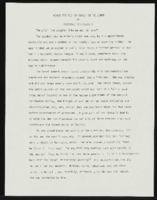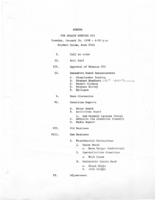Search the Special Collections and Archives Portal
Search Results

"Never Too Old To Forget Or To Learn": short story by Roosevelt Fitzgerald
Date
Archival Collection
Description
From the Roosevelt Fitzgerald Professional Papers (MS-01082) -- Short stories and poems by Roosevelt Fitzgerald file.
Text

Mario C. Monaco interview, March 12, 1981: transcript
Date
Archival Collection
Description
On March 12, 1981, Kim Rhodes interviewed Mario C. Monaco (born in Italy) about his life as an educator in Las Vegas, Nevada. During the interview, Monaco speaks about his various teaching positions, how he ended up in Las Vegas, the changes seen in the Clark County School District and how it compares to educational districts throughout the nation. Moreover, Monaco discusses wages and teacher education opportunities, sports and extracurricular activities in school, community involvement, and racial integration through busing. Lastly, Monaco talks about his appointment to Director of Vocational Education in the Clark County School Districts, the programs offered by the vocational center in the valley and the importance of education.
Text

Meeting minutes for Consolidated Student Senate, University of Nevada, Las Vegas, January 24, 1978
Date
Archival Collection
Description
Text

Andres Dominguez oral history interview: transcript
Date
Archival Collection
Description
Oral history interview with Andres Dominguez conducted by Marcela Rodriguez Campo, Laurents Bañuelos-Benitez, and Barbara Tabach on February 11, 2019 for the Latinx Voices of Southern Nevada Oral History Project. In this interview, Dominguez discusses his upbringing in Las Vegas, Nevada and growing up on the Eastside. He talks about the history of barbering in his family, and his path to becoming a barber. Dominguez describes the process of acquiring the barbershop at the El Cortez Hotel and Casino, and the significance of the location to his family. Lastly, Dominguez discusses his perspective on life, the importance of networking, and his decision in naming his shop Speakeasy Barbershop LV.
Text

Transcript of interview with Arby Hambric by Claytee D. White, September 23, 2015
Date
Archival Collection
Description
Arby L. Hambric's book entitled, "To Thee I See: From picking in the fields of Texas to cooking for dignitaries on U.S. Navy ships, a journey I wouldn't change," describes his profound journey from working in the cotton fields as a child to being drafted into the U.S. Navy, before completing high school. During this interview, he recalls the significant achievements of the "Red Tails" and the Tuskegee Airmen. Beginning his 20 year Navy career before military integration, Arby describes the racial tensions that plagued the U.S. Navy in the 1940s, and discusses how he was able to successfully navigate that racist environment for two decades and three war eras. Arby enrolled in San Diego State College after leaving the U.S. Navy. He also worked as maintenance personnel for Sears and Roebuck and started a catering business with his wife. He became a member of the Southern Nevada Enterprise Community, SNEC Board upon moving to Las Vegas, Nevada, after his wife died. With a family legacy he can be proud of, Arby highlights the achievements of his great grandson Taquan Mizzell, a Virginia Cavaliers running back at the University of Virginia. As a Navy veteran, Arby often volunteered his time and resources to help others in need. He recalls driving the sick and elderly back and forth from the Westside community to Valley Hospital or University Medical Center, UMC. He also discusses government enforced road closures and a wall that was built to block Blacks from entering the new downtown. This interview sheds new light on military integration and offers key strategies for overcoming environmental racism. Arby mentions a documentary about the closing of the wall and offers his predictions on the future of the Westside.
Text

James L. Hogan interview, March 11, 1978: transcript
Date
Archival Collection
Description
On March 11, 1978, collector Patty L. Baratti interviewed James Hogan (born April 6th, 1909 in Winton Place, Ohio) at his home in Las Vegas, Nevada. In this interview, Hogan talks about his time working with the telephone company in Arizona and moving to Las Vegas, Nevada. He discusses his time working on grazing rights and cattle ranching in Nevada and how planning went to ensure that farms were able to have land to graze their animals. He speaks about dealing with farmers, corporations, and the government and the frustrations he had to deal with before there were set laws about grazing. He also discusses the change from mainly family farms in Nevada to corporations owning much of the farmland.
Text

Interview with Ian Dominic Zabarte, April 4, 2007
Date
Archival Collection
Description
Access note: Audio temporarily sealed. May not quote in any form without written permission from interviewee
Text

Harold McKay interview, March 13, 1981: transcript
Date
Archival Collection
Description
On March 13, 1981, Dana Jamerson interviewed Harold McKay (b. July 27th, 1903 in Dresden, Kansas) about his life as a teacher in Las Vegas, Nevada. McKay speaks about his education, his move from Chicago, Illinois to Las Vegas and how he began his career in education. McKay focuses on how and why he founded the Teacher’s Credit Union, his time working in administration and his business school, as well as the problems related to segregation and integration in the educational system. Lastly, he talks about the growth of the gaming and entertainment industry in Las Vegas, and his volunteer work with the Senior Citizen Center.
Text

Jahaira Farias interview, April 12, 2019: transcript
Date
Archival Collection
Description
Interviewed by Monserrath Hernández and Barbara Tabach. Jahaira Farias is a graduate of Western High School, a Marine Corps veteran, and a founder of a local chapter of the Women Marines Association. At the time of this oral history, Jahaira worked for US Congresswoman Susie Lee. Jahaira Farias was born in Las Vegas, Nevada, and grew up on the west side of town. She has summertime memories of her travels to Mexico, where she was able to connect with her family's heritage and language. During her years at Western High School, she participated in varsity sports and was the armed drill team commander. After graduation, Jahaira enlisted into the Marine Corps, where she specialized as a transport operator and hazardous material transporter and served two deployments in Iraq and Afghanistan. Her transition to civilian life included work in security at Caesars Palace. When she took a position with as district representative for Congresswoman Susie Lee, her focus was to assist veterans and immigrants. She helped Rep. Lee develop community outreach towards the Latinx community and Veterans. Jahaira is the president of the Las Vegas NV-3 Sagebrush Marines chapter of the Women Marines Association, an organization she helped establish and rebuild. The WMA helps veterans find their footing again through mentoring and support, and conducts community engagement by fostering the same camaraderie found in the Corps. After surviving a motorcycle accident, Jahaira's recovery is nothing short of miraculous, going from being in a wheelchair to competing in Tough Mudder. Now extremely active, Jahaira is an avid hiker and certified yoga instructor, specializing in trauma recovery. A polyglot, Jahaira formally studied Arabic and Russian, and speaks English, Spanish, and Pashto, and received an associate degree in Russian from the College of Southern Nevada.
Text

Transcript of interview with Midge Innis by James Thomas Griffin, May 8, 1976
Date
Archival Collection
Description
On May 8, 1976, James Thomas Griffin interviewed former casino dealer Midge Innis (born September 23rd, 1928 in Neligh, Nebraska) in her apartment in Las Vegas, Nevada about her life in Southern Nevada. The two discuss her occupational history as well as how she met her husband. The interview concludes Innis’ thoughts on environmental and social shifts in Las Vegas.
Text
